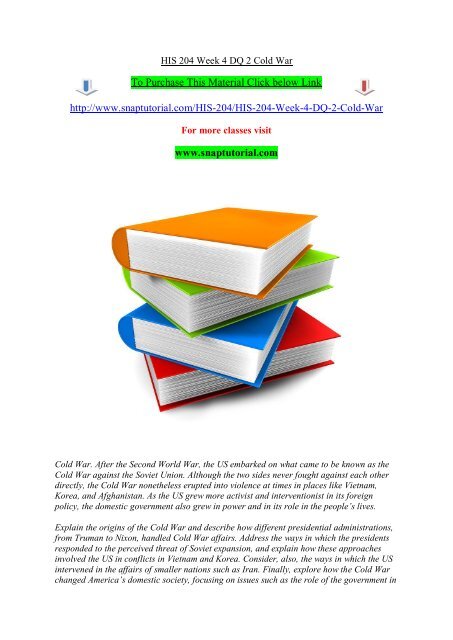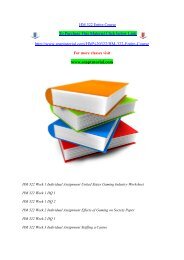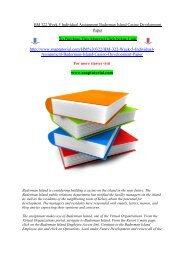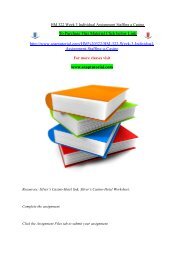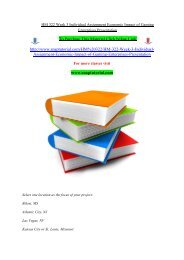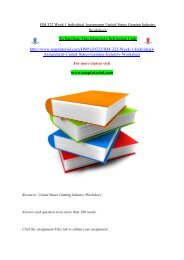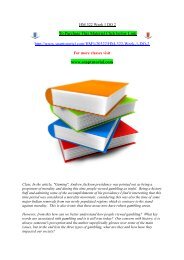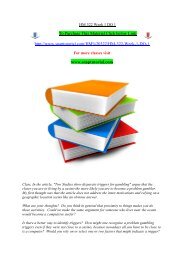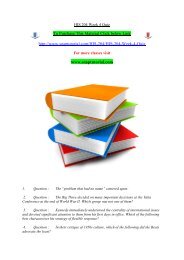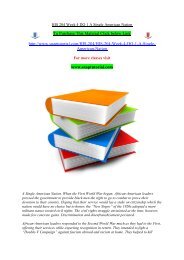HIS 204 Week 4 DQ 2 Cold War/snaptutorial
For more classes visit www.snaptutorial.com Cold War. After the Second World War, the US embarked on what came to be known as the Cold War against the Soviet Union. Although the two sides never fought against each other directly, the Cold War nonetheless erupted into violence at times in places like Vietnam, Korea, and Afghanistan. As the US grew more activist and interventionist in its foreign policy, the domestic government also grew in power and in its role in the people’s lives. Explain the origins of the Cold War and describe how different presidential administrations, from Truman to Nixon, handled Cold War affairs. Address the ways in which the presidents responded to the perceived threat of Soviet expansion, and explain how these approaches involved the US in conflicts in Vietnam and Korea. Consider, also, the ways in which the US intervened in the affairs of smaller nations such as Iran. Finally, explore how the Cold War changed America’s domestic society, focusing on issues such as the role of the government in people’s lives, the Red Scare, the return of domesticity, and growing distrust toward the federal government. Summarize your thoughts on the issues above by answering the following questions: a. Why did the Cold War start and how did it develop over its first three decades? b. What were its most important effects at home and abroad? When responding to these prompts, draw from the material in ONE of the following videos: a. The post-war years b. Superpowers collide c. 1930-1960 Also, draw from the material in THREE of the following documents: a. Electronic briefing book no. 28: The secret CIA history of the Iran coup, 1953 b. Farewell address c. Protestant-Catholic-Jew: An essay in American religious sociology (1960) d. The Tonkin Gulf incident; 1964 e. Address on the Cuban crisis October 22, 1962 f. March 9th memo from Kissinger to Nixon g. Richard Nixon’s resignation
For more classes visit
www.snaptutorial.com
Cold War. After the Second World War, the US embarked on what came to be known as the Cold War against the Soviet Union. Although the two sides never fought against each other directly, the Cold War nonetheless erupted into violence at times in places like Vietnam, Korea, and Afghanistan. As the US grew more activist and interventionist in its foreign policy, the domestic government also grew in power and in its role in the people’s lives.
Explain the origins of the Cold War and describe how different presidential administrations, from Truman to Nixon, handled Cold War affairs. Address the ways in which the presidents responded to the perceived threat of Soviet expansion, and explain how these approaches involved the US in conflicts in Vietnam and Korea. Consider, also, the ways in which the US intervened in the affairs of smaller nations such as Iran. Finally, explore how the Cold War changed America’s domestic society, focusing on issues such as the role of the government in people’s lives, the Red Scare, the return of domesticity, and growing distrust toward the federal government. Summarize your thoughts on the issues above by answering the following questions:
a. Why did the Cold War start and how did it develop over its first three decades?
b. What were its most important effects at home and abroad?
When responding to these prompts, draw from the material in ONE of the following videos:
a. The post-war years
b. Superpowers collide
c. 1930-1960
Also, draw from the material in THREE of the following documents:
a. Electronic briefing book no. 28: The secret CIA history of the Iran coup, 1953
b. Farewell address
c. Protestant-Catholic-Jew: An essay in American religious sociology (1960)
d. The Tonkin Gulf incident; 1964
e. Address on the Cuban crisis October 22, 1962
f. March 9th memo from Kissinger to Nixon
g. Richard Nixon’s resignation
Create successful ePaper yourself
Turn your PDF publications into a flip-book with our unique Google optimized e-Paper software.
<strong>HIS</strong> <strong>204</strong> <strong>Week</strong> 4 <strong>DQ</strong> 2 <strong>Cold</strong> <strong>War</strong>To Purchase This Material Click below Linkhttp://www.<strong>snaptutorial</strong>.com/<strong>HIS</strong>-<strong>204</strong>/<strong>HIS</strong>-<strong>204</strong>-<strong>Week</strong>-4-<strong>DQ</strong>-2-<strong>Cold</strong>-<strong>War</strong>For more classes visitwww.<strong>snaptutorial</strong>.com<strong>Cold</strong> <strong>War</strong>. After the Second World <strong>War</strong>, the US embarked on what came to be known as the<strong>Cold</strong> <strong>War</strong> against the Soviet Union. Although the two sides never fought against each otherdirectly, the <strong>Cold</strong> <strong>War</strong> nonetheless erupted into violence at times in places like Vietnam,Korea, and Afghanistan. As the US grew more activist and interventionist in its foreignpolicy, the domestic government also grew in power and in its role in the people’s lives.Explain the origins of the <strong>Cold</strong> <strong>War</strong> and describe how different presidential administrations,from Truman to Nixon, handled <strong>Cold</strong> <strong>War</strong> affairs. Address the ways in which the presidentsresponded to the perceived threat of Soviet expansion, and explain how these approachesinvolved the US in conflicts in Vietnam and Korea. Consider, also, the ways in which the USintervened in the affairs of smaller nations such as Iran. Finally, explore how the <strong>Cold</strong> <strong>War</strong>changed America’s domestic society, focusing on issues such as the role of the government in
people’s lives, the Red Scare, the return of domesticity, and growing distrust toward thefederal government. Summarize your thoughts on the issues above by answering thefollowing questions:a. Why did the <strong>Cold</strong> <strong>War</strong> start and how did it develop over its first three decades?b. What were its most important effects at home and abroad?When responding to these prompts, draw from the material in ONE of the following videos:a. The post-war yearsb. Superpowers collidec. 1930-1960Also, draw from the material in THREE of the following documents:a. Electronic briefing book no. 28: The secret CIA history of the Iran coup, 1953b. Farewell addressc. Protestant-Catholic-Jew: An essay in American religious sociology (1960)d. The Tonkin Gulf incident; 1964e. Address on the Cuban crisis October 22, 1962f. March 9th memo from Kissinger to Nixong. Richard Nixon’s resignationh. SDS Vietnam anti-war speechi. The vital center: The politics of freedomj. The war powers actYour initial post should be at least 200 words in length. Support your claims with examplesfrom the required material(s) and/or other scholarly resources, and properly cite anyreferences. Respond to at least two of your classmates’ posts by Day 7 in at least 100 words.When responding to classmates, you should refer to the material from one of the sourceswhich you did not reference in your initial post.


